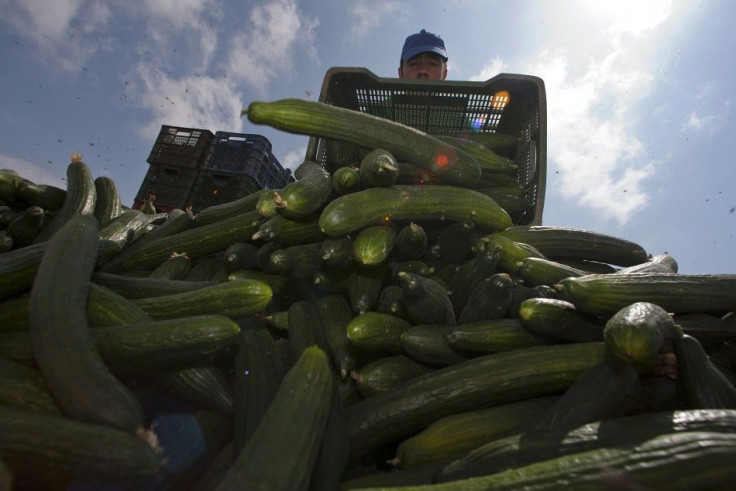Do Monsanto Cucumbers Cause 'Genital Baldness'? Online Rumor Originated As Satire

People across the world are up in arms over genetically modified organisms and Monsanto Company (NYSE:MON) in particular, as the March Against Monsanto proved Saturday, when as many as 2 million protesters took to the streets worldwide to protest the reviled company.
So when a sensational article hit the Internet recently claiming that genetically modified cucumbers licensed by Monsanto are causing an ailment described as "genital baldness," it wasn't surprising that it took off like wildfire, spreading quickly via social media.
The article states that "a six-month study by AgriSearch, an on-campus research arm of Canada's Dalhousie University," has determined that consumption of cucumbers grown under license to Monsanto can lead to major side effects like "total groin hair loss" and pubic-area chafing.
The article goes on to claim that the study of 643 Nova Scotians has resulted in Nova Scotia banning sales of Monsanto cucumbers and dill pickles made from them.
But the readers who spread this sordid story missed the point: It's a satire. The Lapine, which posted the story, produces humor pieces along the lines of The Onion (in fact the website's motto is "Rabbits eat Onions"), and this was just another of their attempts to spoof current events.
And it appears to have been a massive success, as a number of media organizations, blogs and message boards have aggregated or reposted the article, taking it and face value and warning readers to stay away from Monsanto cukes.
Perhaps they should have considered the source, but also they should have been tipped off by some of the silly language in the Lapine article.
The article quotes a "Dr. Nancy Walker, Director of Public Health Research at Dalhousie," as offering a comment that doesn't pass the smell test.
"Fully 3/4 of the people who ate these cukes had their crotch area hair fall out," the official (who is actually an instructor at the Canadian school, according to LinkedIn) stated. "This is not a joking matter at all ... these people now have hairless heinies."
The "study" was supposedly undertaken after researchers noticed baldness in animals that had eaten the GMO cucumbers. There was no study, and the success of the ruse points at the frantic nature of the ongoing debate over whether or not GMO and genetically engineered products are harmful.
There are some real concerns surrounding the potential health risks of GMOs, as studies have revealed that they may contribute to problems ranging from kidney and liver damage to reproductive system issues.
But a lot of junk science, wild speculation and hysteria is also being bandied about in discussions of Monsanto and GMOs, and it's this fact that The Lapine poked fun at in its entertaining piece on Monsanto cucumbers and "genital baldness."
The piece also piggy-backed off the huge uproar that resulted from the exposure of the so-called "Monsanto Protection Act," a piece of legislation passed earlier this year as part of a continuing resoultion that some experts say protects Monsanto and other GMO-producing companies from certain legal challenges.
The moral of this moment in media history: Always take a second to make sure the story you're reading is not a satire before you post it on Facebook with a breathless warning to all your cucumber-loving friends. This one was, after all, published by a site whose recent headlines include "Self-Aware Drones Topple Obama Administration" and "'Stop Timing My Bathroom Breaks' -- 76-Year Old Walmart Greeter."
And with that we'll leave you with one more choice "quote" from the Lapine story, which really should have been enough on its own to tip people off to its falsity:
"'I pulled down my boxer shorts to get ready for bed one night and there it was...a pile of hair that looked like a chihuahua puppy,' said Eric LaMaze, who was paid $50 by Monsanto to compare the tastes of natural cucumbers to Monsanto GM cucumbers in March of this year in Halifax. 'Then I saw my bits and whoa they were like all shiny skin. Bald.'"
© Copyright IBTimes 2024. All rights reserved.











